| Listing 1 - 10 of 14 | << page >> |
Sort by
|
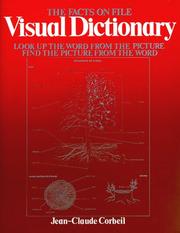
ISBN: 0816015449 9780816015443 Year: 1986 Publisher: New-York: Facts on file,
Abstract | Keywords | Export | Availability | Bookmark
 Loading...
Loading...Choose an application
- Reference Manager
- EndNote
- RefWorks (Direct export to RefWorks)
Picture dictionaries, English --- Handbooks, vade-mecums, etc. --- Handbooks, vade-mecums, etc --- English picture dictionaries --- English language --- Facts, Miscellaneous --- Miscellaneous facts --- Pocket companions --- Vade-mecums, etc. --- Commonplace books --- Encyclopedias and dictionaries
Book
ISBN: 9782503590752 2503590756 Year: 2021 Volume: 11 Publisher: Turnhout: Brepols,
Abstract | Keywords | Export | Availability | Bookmark
 Loading...
Loading...Choose an application
- Reference Manager
- EndNote
- RefWorks (Direct export to RefWorks)
This volume discusses cosmological issues in Greek Patristic and Byzantine question-and-answer literature. By adopting this focus, it yields novel insights into both the (theological / philosophical) content and the (literary) form of the texts under scrutiny. How did Greek Patristic and Byzantine authors understand the cosmos of which they were a part and the world in which they lived? And what literary forms did they use to express their questions and answers on these issues? This collection of studies shows that, in order to bring out the important intellectual contribution of the authors under discussion, both ?cosmology? and ?question-and-answer literature? should be defined more broadly than expected. Several papers deal with the crucial corpora by Pseudo-Justin and Maximus the Confessor. Other authors under discussion include Philoponus, Pseudo-Caesarius, Michael Psellus, Severian of Gabala, and Nilus Doxopatrius. Attention also goes to the critical edition of question and answer literature, as well as to the Greek Patristic and Byzantine reception of cosmological questions and answers from Antiquity (i.c. Aristotle, Philo of Alexandria, Plutarch, and Iamblichus).
Christian literature, Early --- Theology --- Questions and answers --- Answers to questions --- Facts, Miscellaneous --- Miscellaneous facts --- Queries --- Question boxes --- Quiz books --- Trivia --- Encyclopedias and dictionaries --- History and criticism --- Miscellanea&delete& --- History --- Christian theology --- Theology, Christian --- Christianity --- Religion --- Miscellanea
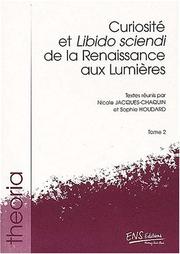
ISSN: 12640514 ISBN: 2902126549 9782902126545 9791036203657 Year: 1998 Volume: *4 Publisher: Fontenay-aux-Roses: École normale supérieure,
Abstract | Keywords | Export | Availability | Bookmark
 Loading...
Loading...Choose an application
- Reference Manager
- EndNote
- RefWorks (Direct export to RefWorks)
Dès l’Antiquité, qu’elle soit païenne ou judéo-chrétienne, la libido sciendi apparaît, dans divers systèmes de représentation, comme l’un des principes constitutifs de l’homme, mais suscite, chez les théologiens comme chez les philosophes, quelque méfiance. Cet ouvrage, travail collectif, issu des curiosités de chercheurs d’horizons divers et publié dans le cadre du Centre de recherche Li Di Sa (Littérature et Discours du Savoir), s’interroge sur les permanences, le devenir et les métamorphoses des diverses conceptions de la curiosité, dans une période qui va essentiellement de la Renaissance aux Lumières, mais sans s’interdire quelques escapades chronologiques. La place et le rôle que lui réservent les théoriciens dans les divers champs du savoir, les mythes et fictions qu’elle suscite, les objets ou figures qui la symbolisent sont donc étudiés. Apparaissent ainsi, dans leur rapport particulier au désir de connaissance, divers personnages : historiens, philosophes, lecteurs, voyageurs, amateurs d’art, scientifiques, voire inquisiteurs, pour ne citer que quelques avatars des « curieux » évoqués.
Curiosities and wonders --- Curiosity in literature --- Curiosité dans la littérature --- Curiosités --- Curiosités et merveilles --- Enigmas --- Eruditie --- Erudition --- Facts [Miscellaneous ] --- Faits divers --- Learning and scholarship --- Merveilles --- Miscellaneous facts --- Mystères et merveilles --- Nieuwsgierigheid in de literatuur --- Oddities --- Rariteiten en wonderen --- Savoir et érudition --- Sciences -- Énigmes --- Trivia --- Wonders --- Énigmes --- Énigmes scientifiques --- Curiosity --- History --- Curiosity - History --- Literature (General) --- histoire --- littérature --- érudition --- curiosité --- pulsion de savoir
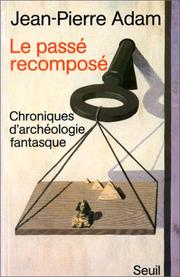
ISBN: 202010363X 9782020103633 Year: 1988 Publisher: Paris: Seuil,
Abstract | Keywords | Export | Availability | Bookmark
 Loading...
Loading...Choose an application
- Reference Manager
- EndNote
- RefWorks (Direct export to RefWorks)
Curiosities and wonders --- Curiosités et merveilles --- Esprit et humour français --- Humor --- Humour --- French wit and humor --- Humor. --- -French wit and humor --- French literature --- Enigmas --- Facts, Miscellaneous --- Miscellaneous facts --- Oddities --- Trivia --- Wonders --- Curiosités et merveilles --- Esprit et humour français --- French wit and humor. --- Curiosities and wonders - Humor
Book
ISBN: 9782503586779 2503586775 Year: 2021 Volume: 301 64 Publisher: Turnhout: Brepols,
Abstract | Keywords | Export | Availability | Bookmark
 Loading...
Loading...Choose an application
- Reference Manager
- EndNote
- RefWorks (Direct export to RefWorks)
his work by Ramon Llull, originally composed in Catalan (‘Art de fer e solre questions’), was written in Rome in 1295. It is also known as ‘Lectura super Artem inventivam et Tabulam generalem’, as it attempts to make the ‘Ars inventiva veritatis’ (op. 44) and ‘Tabula generalis’ (op. 53) more approachable. In the prologue Llull expresses his wish for this work to be translated into Latin. It belongs to the so-called encyclopaedic writings in the Lullian production, and the author announces a thousand questions related mainly to theology. The present work aims to provide a general technique applicable to any subject, a practical usage of the ‘Ars inventiva veritatis’ and the ‘Tabula generalis’. In general, Llull develops some aspects dealt with in op. 44 and op. 53 in order to solve possible objections or to experiment with new procedures. It is another step in the great epistemological project of the Majorcan: to establish a new general science that overcomes the difficulties inherent in scholastic-Aristotelian science; to apply its method to the articles of the Christian faith and to create a universal scientific system as a solid basis for the other sciences.
Grammar, Comparative and general --- Questions and answers --- 2 RAYMUNDUS LULLUS --- 2 RAYMUNDUS LULLUS Godsdienst. Theologie--RAYMUNDUS LULLUS --- Godsdienst. Theologie--RAYMUNDUS LULLUS --- Answers to questions --- Facts, Miscellaneous --- Miscellaneous facts --- Queries --- Question boxes --- Quiz books --- Trivia --- Encyclopedias and dictionaries --- Comparative grammar --- Grammar --- Grammar, Philosophical --- Grammar, Universal --- Language and languages --- Philosophical grammar --- Linguistics --- Philology --- Interrogative --- Grammar, Comparative --- Llull, Ramon, --- Medieval Latin literature
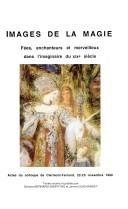
ISBN: 2251605045 9782251605043 Year: 1993 Volume: 504 61 Publisher: Paris: Les Belles Lettres,
Abstract | Keywords | Export | Availability | Bookmark
 Loading...
Loading...Choose an application
- Reference Manager
- EndNote
- RefWorks (Direct export to RefWorks)
Literature, Modern --- Magic in literature --- Littérature --- Magie dans la littérature --- History and criticism --- Congresses --- Histoire et critique --- Congrès --- Magic --- Fairies --- Curiosities and wonders --- History --- Congresses. --- -Fairies --- -Magic --- -Magick --- Necromancy --- Sorcery --- Spells --- Occultism --- Folklore --- Enigmas --- Facts, Miscellaneous --- Miscellaneous facts --- Oddities --- Trivia --- Wonders --- -Congresses --- Conferences - Meetings --- -History --- Littérature --- Magie dans la littérature --- Congrès --- Magick --- History&delete& --- Magic - History - 19th century - Congresses. --- Fairies - History - 19th century - Congresses. --- Curiosities and wonders - History - 19th century - Congresses. --- Magie --- Imaginaire --- Fees dans la litterature francaise --- 19e siecle
Book
ISBN: 9783110245974 3110245973 9783110239058 3110239051 9786613165794 1283165791 Year: 2011 Volume: 2008 Publisher: Berlin: de Gruyter,
Abstract | Keywords | Export | Availability | Bookmark
 Loading...
Loading...Choose an application
- Reference Manager
- EndNote
- RefWorks (Direct export to RefWorks)
Phlegon of Tralles, a learned freedman of Hadrian's, was a prolific writer, but only two of his works have - though not entirely - survived: Peri thaumasion ('On marvellous things') and Peri makrobion ('On long-lived persons'). The former is probably the main extant paradoxographic collection from classical antiquity, mostly famous for some memorable ghost stories (one of which inspired Goethe); the latter reviews long-lived individuals from both archival and literary sources. Both are extensively interespersed with oracles, Sibylline and others. These works were hitherto available in unsatisfactory editions. Stramaglia's new edition relies on a fresh, meticulous collation of the codex unicus (Heidelberg, Palat. Gr. 398); takes complete account of scholarship from the editio princeps (1568) onwards; establishes the text according to a sounder evaluation of Phlegon's language and style; and includes not only a detailed apparatus criticus, but also - for the first time - an apparatus auxiliarius providing loci similes vel paralleli, as well as close bibliographical references and elucidations of obscure or abstruse passages.
Curiosities and wonders --- Curiosités et merveilles --- Longévité --- Didactic poetry, Greek. --- Phlegon, --- Curiosités et merveilles --- Didactic poetry, Greek --- Longevity --- Greek didactic poetry --- Greek poetry --- Enigmas --- Facts, Miscellaneous --- Miscellaneous facts --- Oddities --- Trivia --- Wonders --- Phlegon, Publius Aelius --- Phlegōn, --- Publius Aelius Phlegon --- Trallianus, Phlegon --- Φλέγων, --- Flegonte, --- Longévité --- Early works to 1800 --- Early works to 1800. --- Ouvrages avant 1800 --- Curiosities and wonders - Early works to 1800 --- Hadrian. --- Paradoxography. --- Phlegon.
Book
ISSN: 04795997 ISBN: 9783486582925 3486582925 3486843567 9783486843569 Year: 2008 Volume: 84 Publisher: München: Oldenbourg,
Abstract | Keywords | Export | Availability | Bookmark
 Loading...
Loading...Choose an application
- Reference Manager
- EndNote
- RefWorks (Direct export to RefWorks)
Guibert, Abt von Nogent († um 1125), bekannt vor allem durch seine autobiographische Schrift, tritt uns in seiner polemischen Stellungnahme zum zeitgenössischen Reliquienkult als beinahe aufgeklärter Mensch entgegen. Auf der anderen Seite berichtet er in seinen Werken auch immer wieder von Eingriffen göttlicher oder teuflischer Macht in seine Welt. Karin Fuchs stellt diese Berichte ins Zentrum ihrer Studie: Welche Ereignisse deutete Guibert als Wunder, wie wurden sie kommuniziert, und welche Funktionen hatten überirdische Zeichen in seinen Schriften und für die intellektuelle Gemeinschaft, in der er sich als Mönch und Abt bewegte?
2 GUIBERTUS A NOVIGENTO --- 235.3*23 --- 235.3*23 Hagiografie: miracula --- Hagiografie: miracula --- 2 GUIBERTUS A NOVIGENTO Godsdienst. Theologie--GUIBERTUS A NOVIGENTO --- Godsdienst. Theologie--GUIBERTUS A NOVIGENTO --- Miracles. --- Curiosities and wonders. --- Miracles --- Curiosités et merveilles --- Guibert, --- Criticism, interpretation, etc. --- Benedictines --- Enigmas --- Facts, Miscellaneous --- Miscellaneous facts --- Oddities --- Trivia --- Wonders --- God --- Marvelous, The --- Miracle workers --- Spiritual healing --- Supernatural --- Giber, --- Guibert de Nogent, --- Guibert von Nogent, --- Nogent, Guibert de, --- Curiosities and wonders --- Guibert de Nogent --- Guibert, - Abbot of Nogent-sous-Coucy, - 1053-ca. 1124
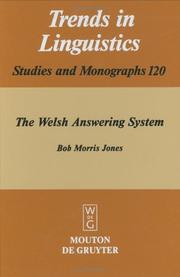
ISBN: 3110800594 9783110800593 3110164507 9783110164503 Year: 1999 Volume: 120 Publisher: Berlin New York Mouton de Gruyter
Abstract | Keywords | Export | Availability | Bookmark
 Loading...
Loading...Choose an application
- Reference Manager
- EndNote
- RefWorks (Direct export to RefWorks)
No detailed description available for "The Welsh Answering System".
Welsh language --- Children --- Questions and answers. --- Answers to questions --- Facts, Miscellaneous --- Miscellaneous facts --- Queries --- Question boxes --- Quiz books --- Trivia --- Encyclopedias and dictionaries --- Childhood --- Kids (Children) --- Pedology (Child study) --- Youngsters --- Age groups --- Families --- Life cycle, Human --- Cambrian language --- Cambric language --- Cymraeg language --- Cymric language --- Brythonic languages --- Discourse analysis. --- Social aspects --- Language. --- Questions and answers --- Gallois (Langue) --- Enfants --- Questions et réponses --- Discourse analysis --- Language --- Analyse du discours --- Aspect social --- Langage --- Welsh language - Discourse analysis --- Welsh language - Social aspects - Wales --- Children - Wales - Language
Book
ISBN: 250303831X 2503038328 9782503038322 9782503038315 Year: 1988 Volume: 83 Publisher: Turnholti Brepols
Abstract | Keywords | Export | Availability | Bookmark
 Loading...
Loading...Choose an application
- Reference Manager
- EndNote
- RefWorks (Direct export to RefWorks)
Christian fundamental theology --- Medieval Latin literature --- Curiosities and wonders --- Miracles --- Curiosités et merveilles --- Early works to 1800 --- Ouvrages avant 1800 --- Early works to 1800. --- Early works to 1900. --- #GGSB: Latijnse patrologie (tekst) --- -Miracles --- -#GROL:SEMI-277<08> Medi 83 --- 230.005 --- God --- Marvelous, The --- Miracle workers --- Spiritual healing --- Supernatural --- Enigmas --- Facts, Miscellaneous --- Miscellaneous facts --- Oddities --- Trivia --- Wonders --- Early works to 1900 --- Religion Christian theology Serial publications --- Curiosités et merveilles --- #GROL:SEMI-277<08> Medi 83 --- Latijnse patrologie (tekst) --- Miracles - Early works to 1800 --- Curiosities and wonders - Early works to 1900.
| Listing 1 - 10 of 14 | << page >> |
Sort by
|

 Search
Search Feedback
Feedback About UniCat
About UniCat  Help
Help News
News